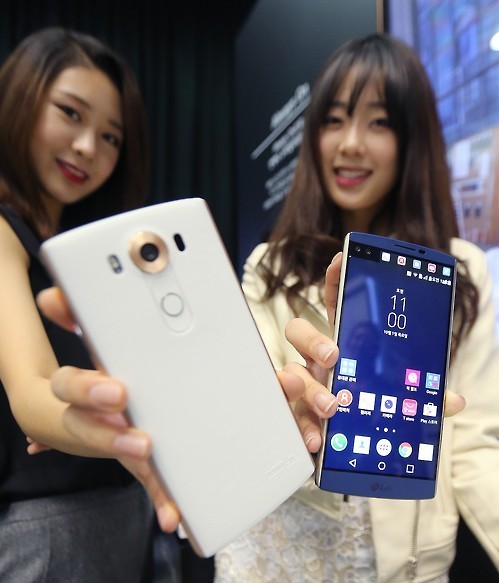- California Assembly OKs highest minimum wage in nation
- S. Korea unveils first graphic cigarette warnings
- US joins with South Korea, Japan in bid to deter North Korea
- LPGA golfer Chun In-gee finally back in action
- S. Korea won’t be top seed in final World Cup qualification round
- US men’s soccer misses 2nd straight Olympics
- US back on track in qualifying with 4-0 win over Guatemala
- High-intensity workout injuries spawn cottage industry
- CDC expands range of Zika mosquitoes into parts of Northeast
- Who knew? ‘The Walking Dead’ is helping families connect
LG seeks rebound with V10

Two models show off the latest smartphone V10, manufactured by LG Electronics Co., during a publicity event in Seoul on Oct. 1, 2015. The 5.7-inch LG V10 features a QHD IPS Quantum display and a small rectangular display above the larger screen. Although the display seems integrated, the two segments work independently to deliver different information. (Yonhap)
By Kang Yoon-seung
SEOUL (Yonhap) — South Korea’s No. 2 handset maker, LG Electronics Inc., on Thursday showcased its latest high-end smartphone that comes with improved cameras and a dual-display experience, hoping that its mobile business could recover from a deep trough amid increased competition from rivals such as Apple Inc. and other mid-to-low end smartphone makers.
The 5.7-inch LG V10 features a QHD IPS Quantum display and a small rectangular display above the larger screen. Although the display seems integrated, the two segments work independently to deliver different information.
Similar to the edge displays of Samsung’s Galaxy S6 Edge, the display will be used to show messages, weather conditions and other information.
Through the smaller screen, LG has adopted what it calls an “Always-on” feature that displays core information, including battery status on a 24-hour basis.
With the light sensor at the top, the second display will be deactivated when the device is in a pocket or a bag, or face down.
A typical smartphone user activates his or her handset around 150 times a day to check such information, LG said, adding that it has simplified such a process.
The company said the LG V10 also does not need selfie sticks, as one of its two 5-megapixel front cameras comes with a 120-degrees angle feature, allowing users to take selfies of seven to eight people.
Its 16-megapixel back camera also delivers professional high-end video recording, including Electro Image Stabilization. Users can now take stable shots and videos in 16:9 and 12:9 ratios.
It is an upgrade from LG’s other high-end smartphone, the G4, which supports similar features but only for photos.
LG said the official price tag on the device will be 799,700 won (US$676). It is rare for a South Korean tech giant to release a flagship model with an initial local price of below 800,000 won.
The price has been the major area of focus for industry watchers regarding the success of the LG V10, with the No. 2 South Korean tech giant struggling to revitalize its handset sales.
LG’s flagship G4 showcased in April came with a factory price of 825,000 won, but sluggish sales led it to be cut to 699,600 won at end-August. The price is further reduced when taking discounts from mobile carriers into consideration.
“The LG V10 delivers a different experience compared to other rival models. It comes with a different design, durability, video and high-end sounds,” said Cho Jun-ho, who heads LG’s mobile business, adding that the company focused on lowering the price burden so more consumers could enjoy premium models.
When asked about the sales target, LG said it is currently focusing on solidifying its position in the large-display market, without revealing detailed figures.
The LG V10 has improved video-editing and sharing features, so users can promptly post their videos on social-networking services.
Another significant feature of the LG V10 is its intelligent recording technology. The device can selectively record sounds, a feature that can be utilized at concerts.
Additionally, the stainless steel body with a silicon-based “Dura Skin” prevents damage and scratches.
The LG V10 boasts the Qualcomm Snapdragon 808 Processor and runs on the Android 5.1.1. Lollipop. It also comes with a detachable 3,000 mAh battery and the potential to increase data capacity up to 2 TB through micro SD slots.
The device will be available for sale in South Korea on Oct. 8 through the country’s three mobile carriers and gradually expand to other markets.
It comes in white, blue and beige in South Korea, with black and opal-blue available for overseas markets.
LG has been making efforts to revitalize its sluggish smartphone business, in the face of challenges by Samsung and Apple Inc. in the high-end sector and Chinese rivals with budget models.
Its mobile communications business, including smartphones, posted 3.6 trillion won in revenues in the second quarter, nearly flat from a year earlier. Its operating profit nosedived 99.7 percent on-year to 200 million won, which implies it has made only a few cents for every smartphone sold.
“We plan to release two flagships every year, one in the first half and the other in the second half. This way, we can lead the premium market,” Cho said.
“However, we cannot improve our earnings even if our premium models succeed, if the budget products remain dull. We plan to release more low-end devices with improved designs (to revitalize the profitability of the mobile device),” Cho added.















